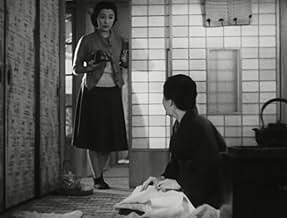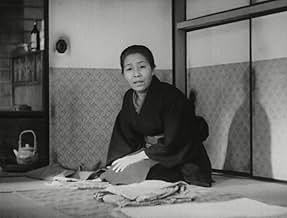VALUTAZIONE IMDb
7,2/10
1533
LA TUA VALUTAZIONE
Una vedova scopre che il defunto marito l'ha lasciata in debito con figli ingrati, tranne un figlio premuroso tornato dalla Cina per sostenerla.Una vedova scopre che il defunto marito l'ha lasciata in debito con figli ingrati, tranne un figlio premuroso tornato dalla Cina per sostenerla.Una vedova scopre che il defunto marito l'ha lasciata in debito con figli ingrati, tranne un figlio premuroso tornato dalla Cina per sostenerla.
- Premi
- 1 vittoria in totale
Recensioni in evidenza
This Yasujirô Ozu film came out just before Japan went to war with the United States. In many ways, it's very typical of any Ozu film. It uses the stationary camera set low to the ground (so the viewer is looking upward at the characters in many scenes, it has a simple plot about families and is centered on normal middle-class Japanese life. This is not a complaint but there is a sameness to Ozu's films that no other director quite achieved.
When the film begins, an extended family is having a day out. When it's over, the family patriarch is happy--telling his wife how it was a perfect day and how wonderful it was to see his kids and grandkids. Only moments later, the man slumps over and soon dies. Now the family is called back for the funeral and everyone must decide what to do with their mother now that father has died. Sadly, through the course of the film you realize that the kids are all very wrapped up in their own lives and no room in their hearts for their mother.
Other than the print being slightly degraded here and there, this DVD from the Criterion Collection is in pretty good shape. As for the story, I think how much you enjoy it will have a lot to do with how many Ozu films you've seen and how patient you are. The film is slow-moving (like many of his film) and the sameness of his films left me a bit bored after a while. Understand, I have probably seen at least 40 of his films. Worth seeing but certainly not among the director's best or most memorable.
When the film begins, an extended family is having a day out. When it's over, the family patriarch is happy--telling his wife how it was a perfect day and how wonderful it was to see his kids and grandkids. Only moments later, the man slumps over and soon dies. Now the family is called back for the funeral and everyone must decide what to do with their mother now that father has died. Sadly, through the course of the film you realize that the kids are all very wrapped up in their own lives and no room in their hearts for their mother.
Other than the print being slightly degraded here and there, this DVD from the Criterion Collection is in pretty good shape. As for the story, I think how much you enjoy it will have a lot to do with how many Ozu films you've seen and how patient you are. The film is slow-moving (like many of his film) and the sameness of his films left me a bit bored after a while. Understand, I have probably seen at least 40 of his films. Worth seeing but certainly not among the director's best or most memorable.
Ozu enters William Wyler terrain with a somber upscale family drama about a mother and daughter who are shuttled in unwelcome fashion from one family member's home to another following the death of the family patriarch. The thematic elements of displacement within a family unit anticipate TOKYO STORY -- there's even a bedtime scene between the mother and daughter that echoes one in the later film. There's a startling lack of music in this film, esp. during Ozu's normally music-filled transitional shots, that contribute to an overall sense of tense unease that touches on what might have been the general wartime state of mind among Japanese at that time. The war makes a subtle appearance in the form of the youngest son who offers to take the unwanted family members with him to settle in China -- a moment which might be aligned with Imperialist propaganda, though in a fascinating way: the Chinese "frontier" seems presented as a place where Japanese society can escape its social hypocrisies and begin anew.
In this 1941 classic, we've seen the ever-existing traditional Japanese male chauvinism. All the men in this film never had to do anything, all the chores were done by the females, no matter they were grandmother, mother or daughter. The men just acted like spoiled kids, asking the women around them to fetch everything they needed. The women had to take back all the heavy chairs after a photo shooting. Men asked his wife to fetch his pants, husband asked his wife to bring a glass of water, make a phone call. All the men were like studs who only took the responsibilities to give sperms to their wives, making them pregnant, making them to be the fathers. They were bread makers. Once they were home after works, they just sat down and gave orders to the females at home to serve them. And the women also took for granted like maids, following all the orders given by their men. We've seen all the Japanese films from black and white since 1020 up to date in 2022, the 21st Century. We saw old Kiki Kirin doing all the chores at home while her son or daughter just sat around, didn't even bother to help her a little bit in all of her later films. I've never seen any male character in any Japanese film helping the females. The male chauvinism is just so astoundingly disgusting in every Japanese film.
Todake No Kyodai wonderfully captures Japanese social mores in its most regrettable form. If you wouldn't know better, you'd think that the people inhabiting the various interiors (almost all of the movie takes place indoors) are mere acquaintances. Strong socio-specific communicative regulations pervade every conversation, every movement, every wink of the eye.
I don't know much about Japanese society, but the fact that the family's mother is given the cold shoulder (after the pater familias had deceased) stroke me as a critique against individualized (westernized?) modern Japan.
I would also like to mention a nice, though unintended effect the movie had on me: the copy has aged gracefully and at times provides cool hallucinating screen compositions and distorted rainfall sounds, which are welcome diversions from the otherwise monotonous goings-on in the still home environments.
I don't know much about Japanese society, but the fact that the family's mother is given the cold shoulder (after the pater familias had deceased) stroke me as a critique against individualized (westernized?) modern Japan.
I would also like to mention a nice, though unintended effect the movie had on me: the copy has aged gracefully and at times provides cool hallucinating screen compositions and distorted rainfall sounds, which are welcome diversions from the otherwise monotonous goings-on in the still home environments.
As usual, you can expect a lot of visual purity from the Ozu movie. This has immaculate framing and great compositions. Except that you can experience the same impeccable cinematic style in any of his other 50 movies, and a better story to boot. I tried to immerse myself in this lineage tale of misunderstandings and family breakdown, but I couldn't help but find it stilted.
I admittedly understand that it is a completely foreign culture to begin with, and a culture of Imperial Japan to boot. Be that as it may, the way the script portrays the supposed disrespect the eldest sister exhibits to the mother is the most spurious domestic argument imaginable, where it is simply impossible for me to gauge "the big deal," so to speak. Have Japanese families lived in perfect harmony before the turn of the century and the Meiji era? Have they never kept information from each other or had misunderstandings about how they should all act when the guests come over? Was there seriously no better way of demonstrating that they didn't want the pair there beyond this plastic irritability with a mother and younger sister melodramatically kneeling in front of the portrait of the late patriarch? Oh, those were better times, indeed. Or were they? Beyond the group photo scene, there wasn't even a good impression of how he ruled the family except for the debts that he left them.
Ultimately, of course, the emancipator son, who, without even knowing what happened, immediately assumes they were forced out and condemned to the villa. The cabin that they say is dilapidated and that they won't even sell seeing it is that bad. Which is an even more dishonest statement than the arguments. Looks cozy to me. Just the same, he rescues them and takes them to Tianjin. Good for them. They'll get in on the ground floor in China. 1941 is just about time.
I admittedly understand that it is a completely foreign culture to begin with, and a culture of Imperial Japan to boot. Be that as it may, the way the script portrays the supposed disrespect the eldest sister exhibits to the mother is the most spurious domestic argument imaginable, where it is simply impossible for me to gauge "the big deal," so to speak. Have Japanese families lived in perfect harmony before the turn of the century and the Meiji era? Have they never kept information from each other or had misunderstandings about how they should all act when the guests come over? Was there seriously no better way of demonstrating that they didn't want the pair there beyond this plastic irritability with a mother and younger sister melodramatically kneeling in front of the portrait of the late patriarch? Oh, those were better times, indeed. Or were they? Beyond the group photo scene, there wasn't even a good impression of how he ruled the family except for the debts that he left them.
Ultimately, of course, the emancipator son, who, without even knowing what happened, immediately assumes they were forced out and condemned to the villa. The cabin that they say is dilapidated and that they won't even sell seeing it is that bad. Which is an even more dishonest statement than the arguments. Looks cozy to me. Just the same, he rescues them and takes them to Tianjin. Good for them. They'll get in on the ground floor in China. 1941 is just about time.
Lo sapevi?
- QuizThere has been speculation that Ozu's direction of this film related to his own family's situation where his sister-in-law (married to his older brother) and mother did not get along.
- ConnessioniReferenced in Bandoui bom (1941)
I più visti
Accedi per valutare e creare un elenco di titoli salvati per ottenere consigli personalizzati
- How long is The Brothers and Sisters of the Toda Family?Powered by Alexa
Dettagli
- Data di uscita
- Paese di origine
- Lingua
- Celebre anche come
- The Brothers and Sisters of the Toda Family
- Luoghi delle riprese
- Azienda produttrice
- Vedi altri crediti dell’azienda su IMDbPro
- Tempo di esecuzione
- 1h 45min(105 min)
- Colore
- Mix di suoni
- Proporzioni
- 1.37 : 1
Contribuisci a questa pagina
Suggerisci una modifica o aggiungi i contenuti mancanti


















